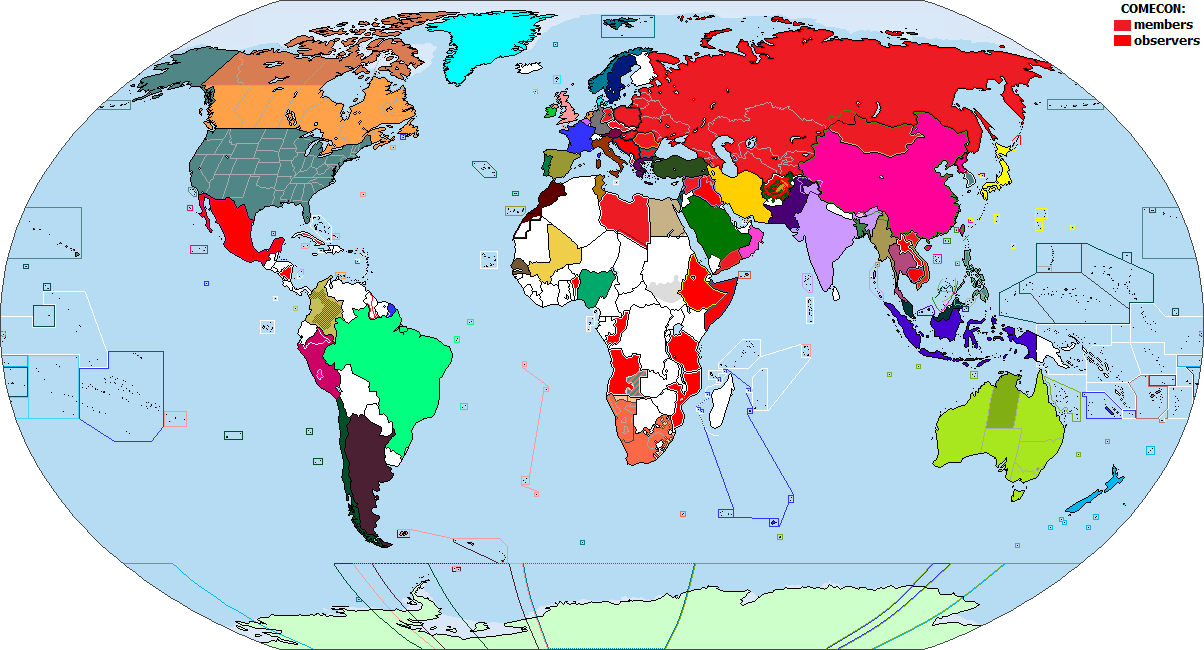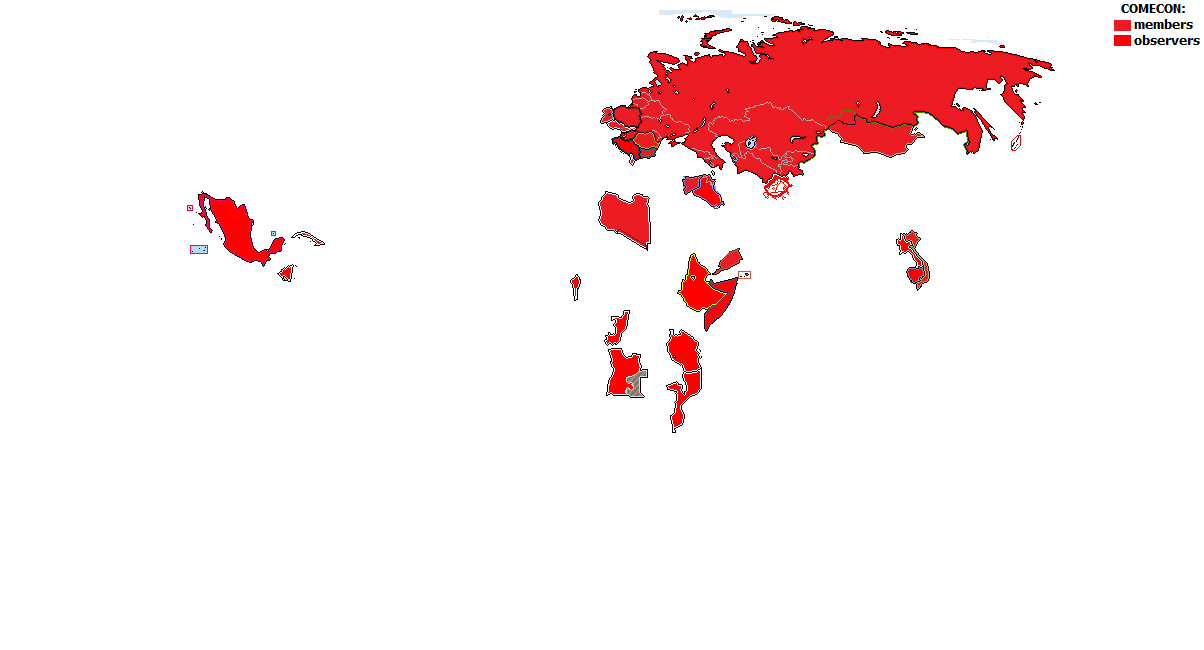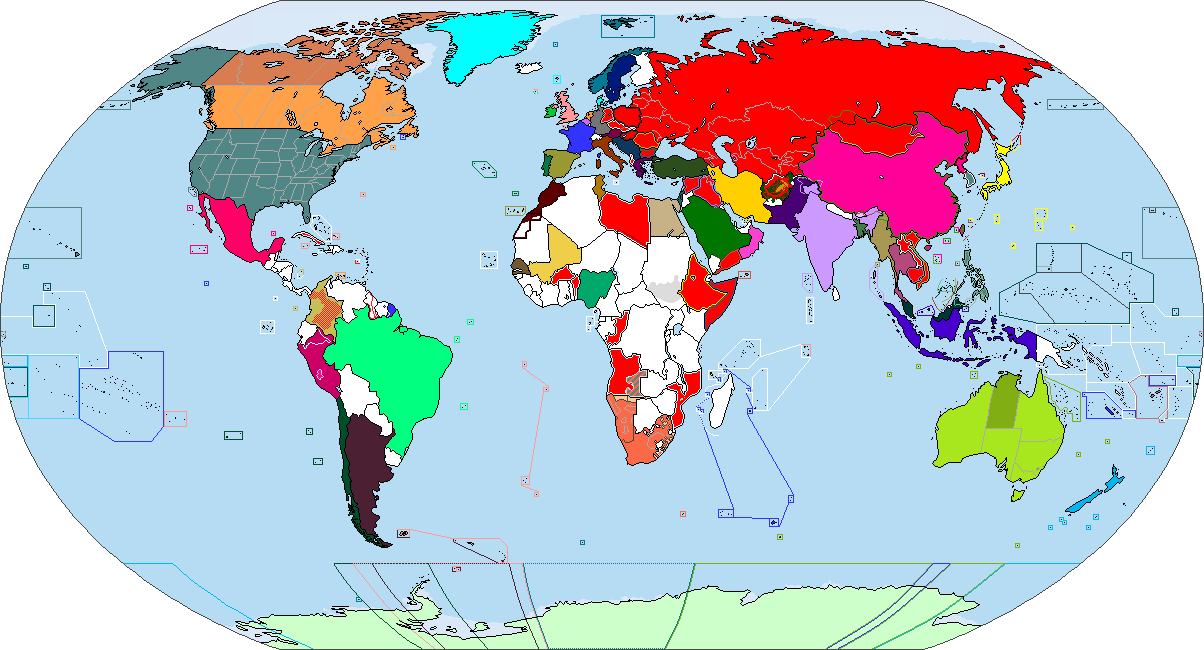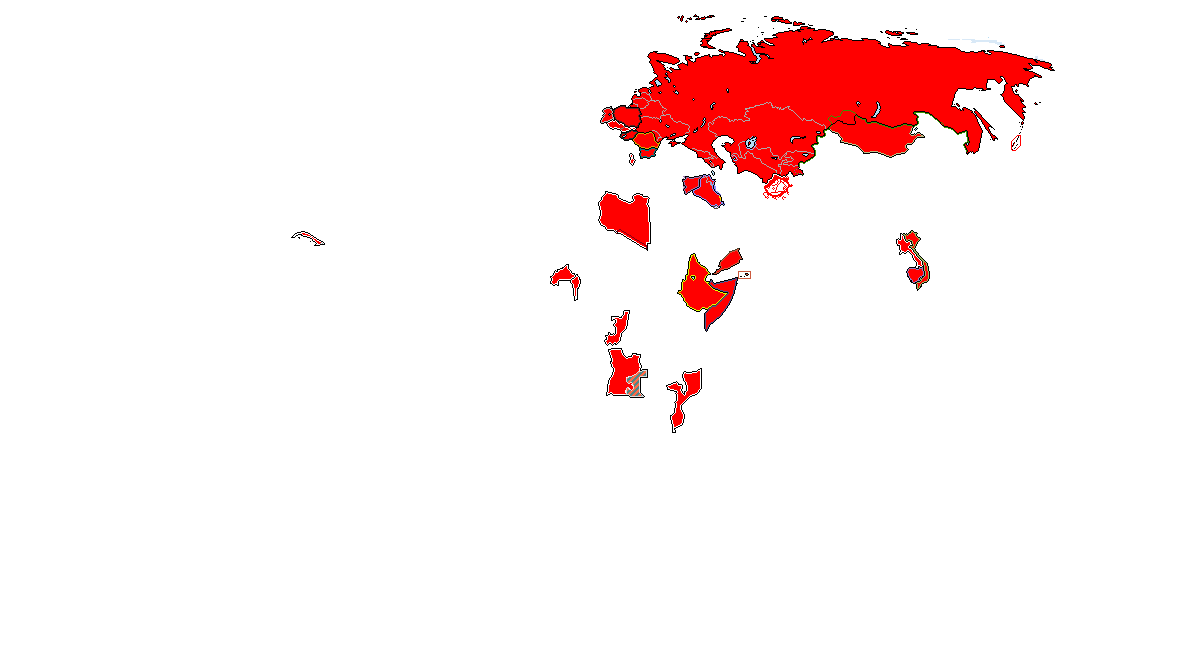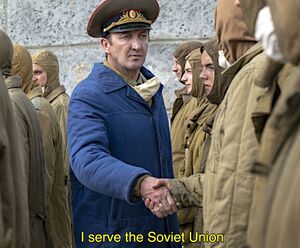Chapter Twenty Two: The Moscow Summit and Andreeva's debut (January 1988 - August 1988)
Chapter Twenty Two: The Moscow Summit and Andreeva's debut (January 1988 - August 1988)
In May 1988 a major change occurred at the one of the highest levels of Soviet politics, although with little real effect. Second General Secretary Dinmukhamed Kunaev finally left his post, following on from his announcement in January, this left one of the highest offices of Soviet politics empty and an election soon followed. Eduard Shevardnadze was successful in his bid for the office of Second General Secretary. Shevardnadze was born on the 25th January 1928 in the village of Mamati, Georgia (Then the Transcaucasian SFSR). From a young age Shevardnadze was exposed to politics, his father was a teacher and a dedicated Communist. In 1948, against the wishes of his anti-communist mother, Shevardnadze joined the Georgian Komsomol as a political instructor. While in this position Shevardnadze graduated from the Higher Party School of the Communist Party of Georgia and soon rose through the ranks to become First Secretary of the Georgian Komsomol in 1956. By 1968 he had become highly regarded in the Party, earning him the position of Interior Minister, where he earned a reputation as a fierce fighter against corruption within the Party. After taking office Shevardnadze asked all leading officials to show him their wrists, ordering those with black-market Western watches to hand them over and replace them with Soviet-made ones. In 1972 First Secretary of the Georgian Communist Party; Vasily Mzhavanadze was forced to resign after facing a corruption scandal, Shevardnadze was seen as a natural replacement and was duly appointed First Secretary. In 1978 Shevardnadze was appointed as a non-voting member of the Politburo, however he remained politically obscure for many years. Though a committed reformer, Shevardnadze wishes to implement his vision for the USSR gradually and opposes Gorbachev’s market ideas. A supporter of Afghan withdrawal and a new round of détente, his time in office will surely ensure a peaceful future for the USSR.

(Eduard Shevardnadze with Mikhail Gorbachev)
In a monumental step for the Soviet space program, in January 1988 the planned construction of the Orbital Assembly and Operations Centre (OSETS) was announced to the world. Consisting of several enormous 90-ton modules, it will be the largest artificial satellite ever constructed, even larger then the planned MKBS, and will provide a basis for further Soviet exploration of the Solar System, especially in the Lunar and Martian Spheres. The construction of OSETS is expected to begin 1993 according to the following plan:
Launch 1 - DOS 8 - providing housing for the assembly crew. Boosted into orbit by the Proton launch vehicle.
Launch 2 - 90 metric ton module launched by the Energia 14A10 version. This will add the GTAS Payload Transfer and Supply System tug to the basic Energia configuration. The tug will deliver the module to the station, dock it, then depart and deorbit itself.
Launch 3 - Truss and solar arrays, launched by Energia.
Launches 4-6 - additional 90 metric ton modules, launched by Energia

(An Artist's rendition of OSETS)
The station will be visited by Buran Shuttles, however it's primary method of supply will not be the Buran shuttle but rather by ballistic capsules such as the Progress M-2 and in future the Zarya spacecraft. OSETS will contain several modules dedicated to various fields of scientific study as well as a new experimental robotic arm for maintenance and logistics purposes. Most excitingly of all it will also provide an orbital control centre for further Soviet space efforts, and a logistical hub for missions deeper into space.

(Mikhail Gorbachev and George Schultz meet in Moscow to discuss the possibility of a joint peace plan)
With the beginning of the First Intifada in Palestine, both the USSR and the USA issued statements affirming their belief in the necessity of negotiations to achieve a lasting peace in the region. With this convergence in policy Secretary of State George Shultz and Minister for Foreign Affairs Mikhail Gorbachev met together in March on the topic of a joint US-Soviet proposal for peace talks. After two weeks of negotiations between the two; the USA and the USSR published the Schultz-Gorbachev Peace Plan on the 28th of March 1988. Whilst the plan did not offer any comprehensive peace plan, leaving out contentious issues such as the status of Jerusalem, it did push for comprehensive negotiations to be held, with representatives from Israel, Palestine, the USA, the USSR, and neighbouring Arab countries. Unfortunately, the peace plan did not receive any welcome from Israeli or Palestinian figures, with Israel objecting to the potential presence of PLO delegates and the PLO viewing the USA's involvement as a ploy to reveal key PLO figures to Israeli authorities. An Israeli spokesman for Prime Minister Yitzhak Shamir stated that no negotiations could occur under the pressure of PLO action, stating “If we try to work under pressure, this will be interpreted by the PLO as a victory.” In the wake of the peace plan’s rejection the USSR decided to abandon it's pursuit of a conference, instead maintaining its course of providing humanitarian aid to Palestine, as well as supporting the leftist wing of the PLO. Though wider talks failed, a mutual position on Palestinian affairs was established between the USA and the USSR and the Schultz-Gorbachev plan became a crucial step in the wider Israeli–Palestinian peace process.
The Battle of Cuito Cuanavale was celebrated by Soviet media as a victory for international Socialism. TASS praised the efforts of Angolan and Cuban forces in defeating a reactionary enemy, however in the echelons of Soviet government the reaction was less joyous, with the defence ministry noting that the FAPLA-Cuban forces failed to win a decisive victory, describing the result as "frankly speaking, an impasse". Nonetheless Soviet support for Angola continued and the battle in the following years became known as a model example of socialist internationalism.
The Black Sea Bumping Incident occurred 12th February 1988 when an American Ticonderoga-class cruiser – the USS Yorktown was bumped by a Soviet Krivak-class frigate – the Bezzavetnyy. In the early morning two US Cruisers; Yorktown, and the USS Caron, conducted an innocent passage into Soviet territorial waters in the Black Sea, Caron passed 10km off the Soviet shore whilst Yorktown only drew to 17km. The Commander of the Black Sea Fleet Mikhail Khronopulo received an order from above to intercept the US warships and curb their passage. Bezzavetnyy was tasked with confronting the USS Yorktown whilst the much smaller Mirka-class frigate, the SKR-6 was tasked with the USS Caron. The two ships were significantly smaller than their American counterparts, with the Bezzavetnyy being half the size of the Yorktown and the SKR-6 having a quarter of the size of the USS Caron. At 10:02 local time 20km from the Soviet coast, supervised by Tupolev Tu-16 bombers, SKR-6 bumped the port side of the Caron 18m from bow, Caron received only superficial damage. Bezzavetnyy likewise bumped the USS Yorktown, losing her starboard anchor in the process, the USS Yorktown like the Caron received virtually no damage. Immediately after the bump Bezzavetnyy cleared to port and took station 270m off Yorktown’s port beam. After the bumping neither US warships departed from their original course, another bumping attempt did not take place.

(The Sword of Qādisiyyah, otherwise known as the Victory Arch, constructed in 1989)
On July 20th 1988 Iran finally accepted UN resolution 598, putting an end to the vicious eight-year conflict that was the Iran-Iraq war. In the face of a new Iraqi offensive, threats of mass chemical attacks and an increasingly discontented leadership Ayatollah Khomeini delivered a reluctant radio address to the world, stating:
“Happy are those who have departed through martyrdom. Happy are those who have lost their lives in this convoy of light. Unhappy am I that I still survive and have drunk the poisoned chalice”
Though the news was greeted by a deep sense of sorrow and bitter disappointment in Tehran, in Baghdad people were jubilant, with accounts of dancing in the streets and spontaneous festivals occurring to celebrate the end of the near decade of slaughter, the Iran-Iraq war was infamous for it's extensive targeting of civilian population centres and use of chemical weapons, the fear of an Iraqi mass chemical attack on Tehran was a major cause of the war's inconclusive end. Ending with no territorial changes between the two powers nor any other concessions, the Iran-Iraq war up to two million people died in the war in brutal conditions, often likened to the western front World War One. Iraq was quick to claim the ceasefire as a 'victory' for Ba'athism and Iraq, drawing parallels with the ancient Battle of al-Qādisiyyah, where the Arab Rashidun Caliphate achieved a crushing victory over the Persian Sassanid Empire. The following year the The Sword of Qādisiyyah, also known as the Victory Arch, was constructed to celebrate Iraq's 'victory' in the Iran-Iraq war, featuring two swords modelled after those used by the Arab general at the Battle of Qādisiyyah in 636 CE.
The Moscow Summit was a meeting between US President Ronald Reagan and Soviet General Secretary Grigory Romanov held from May 29th 1988 to June 3rd 1988. Reagan and Romanov finalised the Intermediate-Range Nuclear Forces Treaty (INF) after the US Senate’s ratification of the treaty. Reagan and Romanov discussed issues such as Angola, Israel-Palestine, Central America, and the withdrawal of Soviet troops from Afghanistan. The parties also agreed and signed several agreements on the subject of student and cultural exchanges, fishing rights, and most importantly discussed the possibility of expanded trade relations between the USA and USSR.


(Ronald Reagan waving and meeting Soviet citizens in Moscow)
Through the 1970s trade between the two countries averaged 1%, peaking in 1979 at US$4.5B. The Soviet Union ran a trade deficit with the United States for the majority of its history, especially in the early years of Romanov’s rule as the USSR aggressively imported western computing technology and industrial equipment, however through 1985-1987 the USSR has slowed down it’s imports whilst increasing it’s exports, in 1987 total trade between the US and the USSR amounted to US$4.3B. The USSR exported chemical goods, raw metals (including gold), and petroleum products in addition to cotton, alcohol and fish to the USA and received mainly agricultural goods in return (a mixture of fertilisers and grain). The value of exports to the USSR from the USA amounted to US$2.6B, half of which consisted of agricultural products, one-quarter industrial equipment and one-quarter high technology. Competition from other parts of the world, improvements in Soviet grain production and industrial quality as well as the rapid computerization promoted by Romanov’s reforms greatly contributed to the increases in Soviet-American trade and trade is only expected to grow as the Soviet Union economically liberalises and expands. At the summit Reagan agreed to lift some controls on high technology exports to the USSR as well as allow for US companies to operate within the USSR, in turn, Romanov agreed to formally end the state monopoly on the US economy, allowing for foreign private companies to operate within the USSR as part of a small market sector, whilst retaining state dominance. The Moscow Summit marked a new chapter in US-Soviet relations and also marked a turning point in Soviet society, as private companies were allowed to formally operate for the first time since the NEP.
Outside of economic matters the two leaders also discussed a collective ban on nuclear testing, joint US-Soviet space missions, and further resolutions on arms reduction. Reagan and Romanov were friendly to each other; discussing many topics such as cinema and literature. However, Reagan often insisted on holding long debates on the subject of Marxism-Leninism and the failings of socialist ideology, a topic which he was woefully underprepared for in the face of Romanov’s socialist education, often embarrassing himself before the Soviet delegation. Nonetheless the Moscow Summit was a great success for both powers, and Reagan even invited Romanov to visit New York alongside him in December, a proposal which Gorbachev urged Romanov to accept, viewing it as a chance to further improve relations and the American public image of the USSR.

(Nina Andreeva in 1988)
‘I Cannot Forsake My Principles’ was an essay published in the newspaper ‘Soviet Russia’ on March 13th 1988, in it the Soviet chemistry lecturer Nina Andreeva wrote a scathing criticism of the reformers who had begun to appear in Soviet media in the mid-1980s during Romanov’s political liberalisation of the country. In this period Soviet media began to openly criticise government policy for the first time in decades and opened up to new political voices who wished to reform the country, sometimes even containing open denouncement of socialist ideals, though these cases were incredibly rare and often suppressed. Regardless during ‘Restalinisation’, as it became to be known, both reformist figures and government condemned Stalin’s ‘excesses’ such as the NKVD’s execution of the Great Purge or the population transfer (deportations) that occurred under Stalin. Andreeva wrote that the purges were “being blown way out of proportion” and complained of “unrelenting criticism of Stalin” from the reformist wing of the Party. Of the reformers, in 1989 Andreeva said to David Remnick of the Washington Post: “Under Stalin the country built socialism for 30 years […] Our media are lying about Stalin now. They are blackening our history." And "The political structure of an anti-socialist movement is taking place in the form of democratic unions and popular fronts." Andreeva spoke positively of the ‘New Left’ faction of the CPSU and praised their dedication to socialist ideas in the face of “Capitalist-roaders”. Andreeva’s essay was politically significant as it marked a new chapter in Soviet politics, where the far-left and the far-right of the CPSU clashed publicly, inspiring new debates and new ideas on the governance and ideology of the USSR. The Maoist political figure, recently pardoned from his 7-year prison sentence, Alexei Razlatsky praised the essay and vowed his support for Andreeva alongside other New Left politicians.
Votes of the Day
1. With Soviet presence in Afghanistan becoming increasingly untenable, What decision should the USSR make on a potential Afghan withdrawal?
2. How should the USSR react to the Black Sea Bumping Incident?
3. How should General Secretary Romanov respond to Reagan’s invitation?
4. How should the government, if at all, respond to Andreeva’s essay?
5. With the USSR market finally opening partially to foreign companies, how should the USSR regulate these companies? Which sectors require the most investment and how will the USSR attract them?
In May 1988 a major change occurred at the one of the highest levels of Soviet politics, although with little real effect. Second General Secretary Dinmukhamed Kunaev finally left his post, following on from his announcement in January, this left one of the highest offices of Soviet politics empty and an election soon followed. Eduard Shevardnadze was successful in his bid for the office of Second General Secretary. Shevardnadze was born on the 25th January 1928 in the village of Mamati, Georgia (Then the Transcaucasian SFSR). From a young age Shevardnadze was exposed to politics, his father was a teacher and a dedicated Communist. In 1948, against the wishes of his anti-communist mother, Shevardnadze joined the Georgian Komsomol as a political instructor. While in this position Shevardnadze graduated from the Higher Party School of the Communist Party of Georgia and soon rose through the ranks to become First Secretary of the Georgian Komsomol in 1956. By 1968 he had become highly regarded in the Party, earning him the position of Interior Minister, where he earned a reputation as a fierce fighter against corruption within the Party. After taking office Shevardnadze asked all leading officials to show him their wrists, ordering those with black-market Western watches to hand them over and replace them with Soviet-made ones. In 1972 First Secretary of the Georgian Communist Party; Vasily Mzhavanadze was forced to resign after facing a corruption scandal, Shevardnadze was seen as a natural replacement and was duly appointed First Secretary. In 1978 Shevardnadze was appointed as a non-voting member of the Politburo, however he remained politically obscure for many years. Though a committed reformer, Shevardnadze wishes to implement his vision for the USSR gradually and opposes Gorbachev’s market ideas. A supporter of Afghan withdrawal and a new round of détente, his time in office will surely ensure a peaceful future for the USSR.
(Eduard Shevardnadze with Mikhail Gorbachev)
In a monumental step for the Soviet space program, in January 1988 the planned construction of the Orbital Assembly and Operations Centre (OSETS) was announced to the world. Consisting of several enormous 90-ton modules, it will be the largest artificial satellite ever constructed, even larger then the planned MKBS, and will provide a basis for further Soviet exploration of the Solar System, especially in the Lunar and Martian Spheres. The construction of OSETS is expected to begin 1993 according to the following plan:
Launch 1 - DOS 8 - providing housing for the assembly crew. Boosted into orbit by the Proton launch vehicle.
Launch 2 - 90 metric ton module launched by the Energia 14A10 version. This will add the GTAS Payload Transfer and Supply System tug to the basic Energia configuration. The tug will deliver the module to the station, dock it, then depart and deorbit itself.
Launch 3 - Truss and solar arrays, launched by Energia.
Launches 4-6 - additional 90 metric ton modules, launched by Energia
(An Artist's rendition of OSETS)
The station will be visited by Buran Shuttles, however it's primary method of supply will not be the Buran shuttle but rather by ballistic capsules such as the Progress M-2 and in future the Zarya spacecraft. OSETS will contain several modules dedicated to various fields of scientific study as well as a new experimental robotic arm for maintenance and logistics purposes. Most excitingly of all it will also provide an orbital control centre for further Soviet space efforts, and a logistical hub for missions deeper into space.
(Mikhail Gorbachev and George Schultz meet in Moscow to discuss the possibility of a joint peace plan)
With the beginning of the First Intifada in Palestine, both the USSR and the USA issued statements affirming their belief in the necessity of negotiations to achieve a lasting peace in the region. With this convergence in policy Secretary of State George Shultz and Minister for Foreign Affairs Mikhail Gorbachev met together in March on the topic of a joint US-Soviet proposal for peace talks. After two weeks of negotiations between the two; the USA and the USSR published the Schultz-Gorbachev Peace Plan on the 28th of March 1988. Whilst the plan did not offer any comprehensive peace plan, leaving out contentious issues such as the status of Jerusalem, it did push for comprehensive negotiations to be held, with representatives from Israel, Palestine, the USA, the USSR, and neighbouring Arab countries. Unfortunately, the peace plan did not receive any welcome from Israeli or Palestinian figures, with Israel objecting to the potential presence of PLO delegates and the PLO viewing the USA's involvement as a ploy to reveal key PLO figures to Israeli authorities. An Israeli spokesman for Prime Minister Yitzhak Shamir stated that no negotiations could occur under the pressure of PLO action, stating “If we try to work under pressure, this will be interpreted by the PLO as a victory.” In the wake of the peace plan’s rejection the USSR decided to abandon it's pursuit of a conference, instead maintaining its course of providing humanitarian aid to Palestine, as well as supporting the leftist wing of the PLO. Though wider talks failed, a mutual position on Palestinian affairs was established between the USA and the USSR and the Schultz-Gorbachev plan became a crucial step in the wider Israeli–Palestinian peace process.
The Battle of Cuito Cuanavale was celebrated by Soviet media as a victory for international Socialism. TASS praised the efforts of Angolan and Cuban forces in defeating a reactionary enemy, however in the echelons of Soviet government the reaction was less joyous, with the defence ministry noting that the FAPLA-Cuban forces failed to win a decisive victory, describing the result as "frankly speaking, an impasse". Nonetheless Soviet support for Angola continued and the battle in the following years became known as a model example of socialist internationalism.
The Black Sea Bumping Incident occurred 12th February 1988 when an American Ticonderoga-class cruiser – the USS Yorktown was bumped by a Soviet Krivak-class frigate – the Bezzavetnyy. In the early morning two US Cruisers; Yorktown, and the USS Caron, conducted an innocent passage into Soviet territorial waters in the Black Sea, Caron passed 10km off the Soviet shore whilst Yorktown only drew to 17km. The Commander of the Black Sea Fleet Mikhail Khronopulo received an order from above to intercept the US warships and curb their passage. Bezzavetnyy was tasked with confronting the USS Yorktown whilst the much smaller Mirka-class frigate, the SKR-6 was tasked with the USS Caron. The two ships were significantly smaller than their American counterparts, with the Bezzavetnyy being half the size of the Yorktown and the SKR-6 having a quarter of the size of the USS Caron. At 10:02 local time 20km from the Soviet coast, supervised by Tupolev Tu-16 bombers, SKR-6 bumped the port side of the Caron 18m from bow, Caron received only superficial damage. Bezzavetnyy likewise bumped the USS Yorktown, losing her starboard anchor in the process, the USS Yorktown like the Caron received virtually no damage. Immediately after the bump Bezzavetnyy cleared to port and took station 270m off Yorktown’s port beam. After the bumping neither US warships departed from their original course, another bumping attempt did not take place.
(The Sword of Qādisiyyah, otherwise known as the Victory Arch, constructed in 1989)
On July 20th 1988 Iran finally accepted UN resolution 598, putting an end to the vicious eight-year conflict that was the Iran-Iraq war. In the face of a new Iraqi offensive, threats of mass chemical attacks and an increasingly discontented leadership Ayatollah Khomeini delivered a reluctant radio address to the world, stating:
“Happy are those who have departed through martyrdom. Happy are those who have lost their lives in this convoy of light. Unhappy am I that I still survive and have drunk the poisoned chalice”
Though the news was greeted by a deep sense of sorrow and bitter disappointment in Tehran, in Baghdad people were jubilant, with accounts of dancing in the streets and spontaneous festivals occurring to celebrate the end of the near decade of slaughter, the Iran-Iraq war was infamous for it's extensive targeting of civilian population centres and use of chemical weapons, the fear of an Iraqi mass chemical attack on Tehran was a major cause of the war's inconclusive end. Ending with no territorial changes between the two powers nor any other concessions, the Iran-Iraq war up to two million people died in the war in brutal conditions, often likened to the western front World War One. Iraq was quick to claim the ceasefire as a 'victory' for Ba'athism and Iraq, drawing parallels with the ancient Battle of al-Qādisiyyah, where the Arab Rashidun Caliphate achieved a crushing victory over the Persian Sassanid Empire. The following year the The Sword of Qādisiyyah, also known as the Victory Arch, was constructed to celebrate Iraq's 'victory' in the Iran-Iraq war, featuring two swords modelled after those used by the Arab general at the Battle of Qādisiyyah in 636 CE.
The Moscow Summit was a meeting between US President Ronald Reagan and Soviet General Secretary Grigory Romanov held from May 29th 1988 to June 3rd 1988. Reagan and Romanov finalised the Intermediate-Range Nuclear Forces Treaty (INF) after the US Senate’s ratification of the treaty. Reagan and Romanov discussed issues such as Angola, Israel-Palestine, Central America, and the withdrawal of Soviet troops from Afghanistan. The parties also agreed and signed several agreements on the subject of student and cultural exchanges, fishing rights, and most importantly discussed the possibility of expanded trade relations between the USA and USSR.
(Ronald Reagan waving and meeting Soviet citizens in Moscow)
Through the 1970s trade between the two countries averaged 1%, peaking in 1979 at US$4.5B. The Soviet Union ran a trade deficit with the United States for the majority of its history, especially in the early years of Romanov’s rule as the USSR aggressively imported western computing technology and industrial equipment, however through 1985-1987 the USSR has slowed down it’s imports whilst increasing it’s exports, in 1987 total trade between the US and the USSR amounted to US$4.3B. The USSR exported chemical goods, raw metals (including gold), and petroleum products in addition to cotton, alcohol and fish to the USA and received mainly agricultural goods in return (a mixture of fertilisers and grain). The value of exports to the USSR from the USA amounted to US$2.6B, half of which consisted of agricultural products, one-quarter industrial equipment and one-quarter high technology. Competition from other parts of the world, improvements in Soviet grain production and industrial quality as well as the rapid computerization promoted by Romanov’s reforms greatly contributed to the increases in Soviet-American trade and trade is only expected to grow as the Soviet Union economically liberalises and expands. At the summit Reagan agreed to lift some controls on high technology exports to the USSR as well as allow for US companies to operate within the USSR, in turn, Romanov agreed to formally end the state monopoly on the US economy, allowing for foreign private companies to operate within the USSR as part of a small market sector, whilst retaining state dominance. The Moscow Summit marked a new chapter in US-Soviet relations and also marked a turning point in Soviet society, as private companies were allowed to formally operate for the first time since the NEP.
Outside of economic matters the two leaders also discussed a collective ban on nuclear testing, joint US-Soviet space missions, and further resolutions on arms reduction. Reagan and Romanov were friendly to each other; discussing many topics such as cinema and literature. However, Reagan often insisted on holding long debates on the subject of Marxism-Leninism and the failings of socialist ideology, a topic which he was woefully underprepared for in the face of Romanov’s socialist education, often embarrassing himself before the Soviet delegation. Nonetheless the Moscow Summit was a great success for both powers, and Reagan even invited Romanov to visit New York alongside him in December, a proposal which Gorbachev urged Romanov to accept, viewing it as a chance to further improve relations and the American public image of the USSR.
(Nina Andreeva in 1988)
‘I Cannot Forsake My Principles’ was an essay published in the newspaper ‘Soviet Russia’ on March 13th 1988, in it the Soviet chemistry lecturer Nina Andreeva wrote a scathing criticism of the reformers who had begun to appear in Soviet media in the mid-1980s during Romanov’s political liberalisation of the country. In this period Soviet media began to openly criticise government policy for the first time in decades and opened up to new political voices who wished to reform the country, sometimes even containing open denouncement of socialist ideals, though these cases were incredibly rare and often suppressed. Regardless during ‘Restalinisation’, as it became to be known, both reformist figures and government condemned Stalin’s ‘excesses’ such as the NKVD’s execution of the Great Purge or the population transfer (deportations) that occurred under Stalin. Andreeva wrote that the purges were “being blown way out of proportion” and complained of “unrelenting criticism of Stalin” from the reformist wing of the Party. Of the reformers, in 1989 Andreeva said to David Remnick of the Washington Post: “Under Stalin the country built socialism for 30 years […] Our media are lying about Stalin now. They are blackening our history." And "The political structure of an anti-socialist movement is taking place in the form of democratic unions and popular fronts." Andreeva spoke positively of the ‘New Left’ faction of the CPSU and praised their dedication to socialist ideas in the face of “Capitalist-roaders”. Andreeva’s essay was politically significant as it marked a new chapter in Soviet politics, where the far-left and the far-right of the CPSU clashed publicly, inspiring new debates and new ideas on the governance and ideology of the USSR. The Maoist political figure, recently pardoned from his 7-year prison sentence, Alexei Razlatsky praised the essay and vowed his support for Andreeva alongside other New Left politicians.
Votes of the Day
1. With Soviet presence in Afghanistan becoming increasingly untenable, What decision should the USSR make on a potential Afghan withdrawal?
2. How should the USSR react to the Black Sea Bumping Incident?
3. How should General Secretary Romanov respond to Reagan’s invitation?
4. How should the government, if at all, respond to Andreeva’s essay?
5. With the USSR market finally opening partially to foreign companies, how should the USSR regulate these companies? Which sectors require the most investment and how will the USSR attract them?
Last edited:
